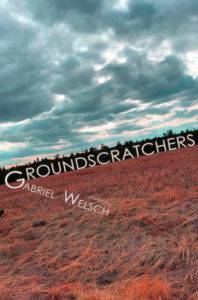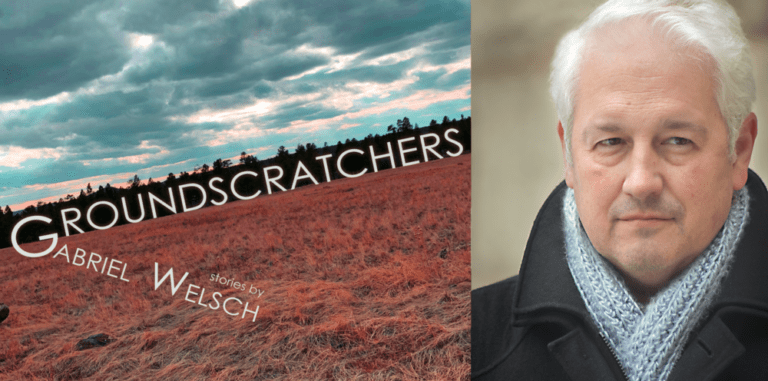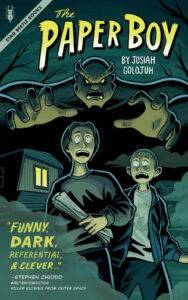About the Author: Gabriel Welsch’s first collection of short stories, Groundscratchers, will be released by Tolsun Books in October. 2021. For nearly 15 years, Welsch worked in the ornamental horticulture and landscaping industries in roles as a crew grunt, production grower, plant buyer, landscape foreman, and garden designer before working in higher education teaching and administration. He writes fiction and poetry, and is the author of four collections of poems: The Four Horsepersons of a Disappointing Apocalypse, The Death of Flying Things, An Eye Fluent in Gray, and Dirt and All Its Dense Labor. His work has appeared widely, in journals including Mid-American Review, Ploughshares, Georgia Review, New Letters, Southern Review, Chautauqua, Harvard Review, Ascent, and on Verse Daily and in Ted Kooser’s column “American Life in Poetry.” A native of Maine and a graduate of the MFA program at Penn State, he now lives in Pittsburgh, Pennsylvania, with his family, and works as vice president of marketing and communications at Duquesne University.
“The characters in Groundscratchers are not always great role models. They keep secrets, surrender to petty impulses, and too often let pride keep them from giving or receiving the compassion that could improve their lives. But they remain a sympathetic bunch in how they strive to see their actions honestly, even when such knowledge won’t undo all the losses they have incurred. Gabriel Welsch presents their stories with unrelenting clarity but also a tenderness that affirms at least the possibility of redemption. Each sentence is a joy of craftsmanship, lyrical language that does not describe these narrative worlds so much as incant them to life. I cannot say what makes a great work of fiction in the abstract, but I do know that Welsch’s characters feel realer to me than many flesh-and-blood humans. Groundscratchers is a remarkable achievement fashioned over two decades, a collection both modest and intense, where even the quietest exchanges invite revelation.” -J. David Stevens, author of Mexico is Missing and I and You

Have to read the book for the full context, but it is a derisive term for a landscaper. I now use it affectionately. I worked in the ornamental horticulture industry for about 15 years and, most years in April, kind of wish I still did.
David Stevens notes, in his description of this collection of stories, that “The characters in GROUNDSCRATCHERS are not always great role models. They keep secrets, surrender to petty impulses, and too often let pride keep them from giving or receiving the compassion that could improve their lives. But they remain a sympathetic bunch.” Why? What makes them sympathetic?
If there’s no struggle, there is no story. And while there are great struggles—war, plague, social upheaval, economic devastation, and the like (you know, 2020)—such society-spanning challenges often are the background to the individual battles people have. Those battles are often with themselves, and they are not trained well. In “Twins,” a community and a father battle their fears when a small child disappears. In “The Mechanics of Heat,” Maury works in conflict management yet cannot stop losing it, and makes it worse when he tries. In “The Visions of Edwin Miller,” the physicist can’t trust what he sees but still has to literally see something in order to confirm his scientific work. In “A Country of Shoes,” Elena is outrunning a horrific memory, making terrible judgments along the way that will haunt her. In “Nguyen Van Thieu is Dead at 78,” the Vietnam War is of course massively present, but the neighborly friction is the story, and the narrator simmers in his own hapless rage. And so on.

For Groundscratchers, if there is any other unifying thematic element, it is the complex linkages between the specifics of the world and how we live among them. Stories here are set amid atomic physics, art and post-Soviet politics, ornamental horticulture, and the lingering effects of the Vietnam War. I have always liked stories with a sort of complex mis-en-scene suggesting depth of context. That said, even the more domestically set pieces connect to elements of religion, politics, and the weight of generational memory.
So, do you return to that theme in your work time and again? If not, what themes do show up in your work?
The complex backdrop thing? Yes. It’s why I enjoy work by folks like Anthony Doerr, Karl Iagnema, Edith Pearlman (she can make a tchotchke open up into a whole universe, like the collar on that cat in Men in Black), Jhumpa Lahiri, and Annie Proulx, to name a few. Maybe it’s telling that most of these folks are more well known as novelists . . .
So, are you writing a novel?
You’re hilarious.
But ok, fine. There are three in a drawer in my office that I already have written.
OK, in your other stories, then? Are they like the ones in Groundscratchers?
Sort of. I like stories where people engage in low-key interpersonal warfare. I am not the guy for a sweeping love story. In Groundscratchers, a few of the longer stories have antagonists waging sustained battle until it goes beyond the acceptable—but not to something like murder or the stuff of crime shows. The devastation simmers more, the victories are more Pyrrhic. Resolution is uncomfortable. That is where I like to write stories.
You say you like to write stories, but you’ve published four books of poems before this—Four Horsepersons of a Disappointing Apocalypse, The Death of Flying Things, An Eye Fluent in Gray, and Dirt and All Its Dense Labor. Is fiction a new direction? How long have you been writing fiction?
Depends who you ask. Ask my mother and she will say forever. I started taking the impulse seriously in my sophomore year of college, so that makes it around 30 years.
I’ve been writing fiction longer than I’ve been writing poetry. I earned my MFA at Penn State, with the emphasis in fiction specifically. One of the program requirements was to take a workshop in at least one other genre. I was annoyed at having to shift focus, and figured poetry would take less away from writing fiction because it was shorter (I did not and never have claimed to be the most astute judge of these kinds of things). The professor, Robin Becker, who later became a mentor, suggested I should take the poetry thing more seriously. She was right.
But I wrote fiction at the same time. A lot of writers do. We all know but sometimes forget that shoving writers into being a “novelist” or “poet” is to give them a category to make marketing easier.
Your poetry books have long titles, but this book has a one-word title. Will future books only have one-word titles?
I do enjoy that I unintentionally made less work for myself by using a one-word title.
Where have you been published?
In magazines few outside the writing community have ever heard of—all run by people volunteering their time and effort (and often personal financial resources) to circulate stories and poems they enjoy and believe others will as well. It’s hard to call out just a few when so many deserve recognition. The stories in the book itself appeared in Mid-American Review, Georgia Review, The Southern Review, New Letters, [PANK], Iron Horse Literary Review, Quarter After Eight, Cream City Review, and Tupelo Quarterly.
Last question: In the title story, Yoshi Higashide, the designer, tells Michael Petrin, the head of grounds, “There are no weeds . . . just different intentionalities.” Do you weed your garden?
The great thing about fiction is that your characters can say stupid things that you do not believe. I weed my garden. Do I do so obsessively? No.
Although when my children weed, I expect them to eliminate all life other than pre-approved specimens and to achieve absolute perfection.
For more information about Groundscratchers, visit https://tolsunbooks.com/shop/groundscratchers.

























